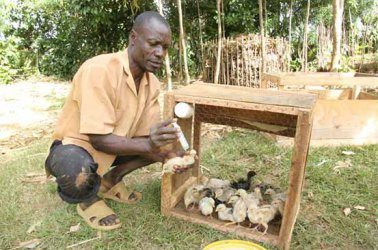In Buloma, a small village in Kakamega County, one farmer has discovered a secret—making herbal remedies that cure some poultry diseases.
John Waswa claims that his herbal concoction—Mukekuma (Mukangala Herbal Kuku Master)—can treat an array of poultry diseases. “I learnt this from my father who learnt from his father and so on. This knowledge is passed on in the family line,” he says as he prepares the ingredients at his Buloma home.
For the last three years Waswa has been making herbal remedies which he uses to treat his chicken; he then sells the surplus to locals.
“I use the Mukangala Herbal Kuku Master herbal cure to treat a number of diseases. When this herbal cure is used for treatment, the chickens recover,” he says.
Waswa mostly uses the herbal cures to control common poultry infections which he calls ‘ukoo’ — these spread fast through the air and kill chicken.
“When there is an outbreak in my neighbourhood, my chicken are spared because I vaccinate them against disease with the Muhekuma herbal cure,” he says.
The farmer produces 20 packets of herbal cure.
“In the last two days I have sold 25 packets . . . the demand is rising.
“During the dry season, the demand is very high and at times I am unable to meet it,” adds Waswa.
The farmer says herbs are effective against New Castle which is caused by a virus that infects the respiratory and nervous system. They do not work on turkeys and ducks.
However, the herbs treat bronchitis, avian influenza, swollen head syndrome and fowl cholera, but not chicken pox.
“My chicken do not get infected even if they mingle with other chicken which are infected. I have managed to control poultry diseases and infections in my compound for the last three years,” he explains.
o make the concoction, Waswa mixes nine different herbs which he gets from his compound.
He then dries the herbs and mixes them in a mortar before crushing them into powder using a pestle.
“The herbal cures are not used on chicks younger than three weeks and may kill them because their immune system is not fully developed,” he explains. For older chicks, the herbal cure is mixed with water or chick mash.nFor every kilogramme of chick mash, he adds one spoon of the herbal powder.
Sometimes he mixes the herbs in milk. The mixture is supposed to be used once because sour milk is poison to chicken.
“I mix the herbs with milk for five minutes then sieve it. For chicks that seem to cough, I administer the drugs through the nostrils but for other ailments, I use a syringe to administer two drops into the chicken’s mouth,” he says.
Waswa sells one packet of the herbal medicine for Sh20 to local people and for between Sh50 and Sh100 to people who visit his stand during exhibitions.
“In the dry season there is a high demand for the drug … vaccinations are more commonly administered during this period. It causes thirst and when administered to chicken they should be given water,” he says.
“Not a single one. Because it is natural, it has no negative effect on the animal’s system,” he assures.
Sounds too good to be true, but what do experts say about herbal medicine in treatment of animals?
University of Nairobi’s veterinarian surgeon Dr Moses Olum cautions that although herbal remedies are commonly used, often there is not much research to establish their effectiveness.
“Some farmers use herbal medicine on their chicken and affirm that they work but that cannot be proved unless more research is done. Poultry diseases like New Castle is seasonal so maybe by the time the farmer applies the drug the disease has not infected the birds, giving the illusion that the drug has worked,” the doctor elaborates.
Olum goes on: “In most cases, people have been using alovera, pepper among other herbs to treat their chicken but scientifically its efficacy has not been proven. Some farmers may say it works but there is no proof.”
A study conducted by Makerere University’s Prof Bukenya Ziraba from the Department of Botany shows that a significant number of poultry farmers in villages use medicinal plants to treat coughs, diarrhoea, swollen eyes, mites worms and lice as well as Newcastle prophylaxis and coccidiosis.

